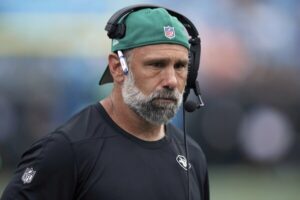Jeff Ulbrich the head coach of new York jets was upset when the team management was..

Jeff Ulbrich, the current defensive coordinator of the New York Jets, has been an influential figure in shaping the team’s defensive strategy since joining the coaching staff. Ulbrich, known for his passion and commitment to the game, has always displayed a strong leadership presence on the field and in the locker room. However, recent rumors and reports suggest that Ulbrich was deeply upset when team management made a decision that seemed to go against the vision he had for the Jets’ defense.
While Ulbrich is not the head coach—Robert Saleh holds that title—he is a significant figure within the organization. As a defensive coordinator, he has full control over the defensive side of the ball and is responsible for the development and performance of key players on defense. Under his leadership, the Jets’ defense has been solid, especially with the rise of players like Quinnen Williams and Sauce Gardner. But it appears there was a moment when a key decision by management did not sit well with him.
The frustration reportedly stemmed from management’s handling of player personnel decisions or perhaps a trade that disrupted the defensive unit. Ulbrich, being a former NFL linebacker himself, values the chemistry and cohesion that a team needs to thrive on defense. Defensive coordinators often develop deep relationships with their players, understanding their strengths, weaknesses, and how they fit into the overall system. When management intervenes—whether by trading away key defensive assets or bringing in players who don’t fit Ulbrich’s scheme—it can disrupt the balance of the defense and create challenges for the coaching staff.
For Ulbrich, the issue could have been a matter of not being consulted on a decision that directly impacted his work. Head coaches like Robert Saleh often have to manage the intersection between coaching staff opinions and the front office’s long-term vision for the team, including financial considerations, player contracts, and future draft picks. This can create tension when those visions clash.
Ulbrich’s track record shows his focus on building a defense that is aggressive, physical, and disciplined. When the team management appears to prioritize financial or draft strategies over maintaining defensive consistency, it’s understandable that Ulbrich might feel upset. He likely wants to ensure that the defense remains a top priority and that moves made by management are in alignment with the team’s immediate goal of winning games and securing playoff berths.
Additionally, if there were player transactions that occurred without Ulbrich’s input, that might have heightened his frustration. Coaches, especially coordinators, need to feel like they have a voice in roster decisions, especially when those decisions affect the side of the ball they oversee. The defensive system is a complex, interconnected unit, and disrupting that with sudden changes in personnel could throw off the timing and rhythm the team has worked hard to develop throughout the offseason and regular season.
Despite these frustrations, Ulbrich remains committed to the team and continues to push the defense to new heights. His passion for the game and commitment to his players is evident in the way the Jets’ defense has performed under his leadership. If there is indeed friction between Ulbrich and the management, it highlights the ongoing challenges NFL teams face in balancing the needs of coaches with the broader strategic goals of the front office.
Leave a Reply